句型转换
句型转换50个

句型转换50个1. 原句:He is a good student.- 否定句:He isn't a good student.- 一般疑问句:Is he a good student?2. 原句:They play football every day.- 否定句:They don't play football every day.- 一般疑问句:Do they play football every day?3. 原句:She has a beautiful dress.- 否定句:She doesn't have a beautiful dress.- 一般疑问句:Does she have a beautiful dress?4. 原句:I like reading books.- 否定句:I don't like reading books.- 一般疑问句:Do you like reading books?5. 原句:There are some apples on the table.- 否定句:There aren't any apples on the table. - 一般疑问句:Are there any apples on the table?6. 原句:He can speak English well.- 否定句:He can't speak English well.- 一般疑问句:Can he speak English well?7. 原句:My mother made a cake yesterday.- 否定句:My mother didn't make a cake yesterday.- 一般疑问句:Did your mother make a cake yesterday?8. 原句:We will go to the park tomorrow.- 否定句:We won't go to the park tomorrow.- 一般疑问句:Will you go to the park tomorrow?9. 原句:The boy is running fast.- 否定句:The boy isn't running fast.- 一般疑问句:Is the boy running fast?10. 原句:She was at home last night.- 否定句:She wasn't at home last night.- 一般疑问句:Was she at home last night?11. 原句:They have been to Beijing.- 否定句:They haven't been to Beijing.- 一般疑问句:Have they been to Beijing?12. 原句:He had a great time at the party.- 否定句:He didn't have a great time at the party. - 一般疑问句:Did he have a great time at the party?13. 原句:I will be a teacher in the future.- 否定句:I won't be a teacher in the future.- 一般疑问句:Will you be a teacher in the future?14. 原句:There is a lot of water in the glass.- 否定句:There isn't a lot of water in the glass.- 一般疑问句:Is there a lot of water in the glass?15. 原句:She reads English every morning.- 否定句:She doesn't read English every morning.- 一般疑问句:Does she read English every morning?16. 原句:They are going to have a party this weekend.- 否定句:They aren't going to have a party this weekend. - 一般疑问句:Are they going to have a party this weekend?17. 原句:He does his homework carefully.- 否定句:He doesn't do his homework carefully.- 一般疑问句:Does he do his homework carefully?18. 原句:I saw a movie last week.- 否定句:I didn't see a movie last week.- 一般疑问句:Did you see a movie last week?19. 原句:We have a lot of homework to do.- 否定句:We don't have a lot of homework to do.- 一般疑问句:Do you have a lot of homework to do?20. 原句:The cat is sleeping under the tree.- 否定句:The cat isn't sleeping under the tree.- 一般疑问句:Is the cat sleeping under the tree?21. 原句:She will write a letter soon.- 否定句:She won't write a letter soon.- 一般疑问句:Will she write a letter soon?22. 原句:There were some people in the room.- 否定句:There weren't any people in the room.- 一般疑问句:Were there any people in the room?23. 原句:He has lived here for five years.- 否定句:He hasn't lived here for five years.- 一般疑问句:Has he lived here for five years?24. 原句:I am reading an interesting book.- 否定句:I'm not reading an interesting book.- 一般疑问句:Are you reading an interesting book?25. 原句:They played basketball yesterday afternoon.- 否定句:They didn't play basketball yesterday afternoon. - 一般疑问句:Did they play basketball yesterday afternoon?26. 原句:She can dance beautifully.- 否定句:She can't dance beautifully.- 一般疑问句:Can she dance beautifully?27. 原句:My father bought a new car last month.- 否定句:My father didn't buy a new car last month.- 一般疑问句:Did your father buy a new car last month?28. 原句:We are going to see a film tonight.- 否定句:We aren't going to see a film tonight.- 一般疑问句:Are you going to see a film tonight?29. 原句:There is some milk in the fridge.- 否定句:There isn't any milk in the fridge.- 一般疑问句:Is there any milk in the fridge?30. 原句:He likes playing the guitar.- 否定句:He doesn't like playing the guitar.- 一般疑问句:Does he like playing the guitar?31. 原句:I have finished my work.- 否定句:I haven't finished my work.- 一般疑问句:Have you finished your work?32. 原句:They were watching TV at eight o'clock last night.- 否定句:They weren't watching TV at eight o'clock last night. - 一般疑问句:Were they watching TV at eight o'clock last night?33. 原句:She will go shopping tomorrow.- 否定句:She won't go shopping tomorrow.- 一般疑问句:Will she go shopping tomorrow?34. 原句:There are five students in the classroom.- 否定句:There aren't five students in the classroom.- 一般疑问句:Are there five students in the classroom?35. 原句:He has a pet dog.- 否定句:He doesn't have a pet dog.- 一般疑问句:Does he have a pet dog?36. 原句:I am going to visit my grandparents this weekend.- 否定句:I'm not going to visit my grandparents this weekend.- 一般疑问句:Are you going to visit your grandparents this weekend?37. 原句:They have seen that movie.- 否定句:They haven't seen that movie.- 一般疑问句:Have they seen that movie?38. 原句:She was reading a novel when I came in.- 否定句:She wasn't reading a novel when I came in.- 一般疑问句:Was she reading a novel when you came in?39. 原句:He will be back soon.- 否定句:He won't be back soon.- 一般疑问句:Will he be back soon?40. 原句:There were some books on the desk.- 否定句:There weren't any books on the desk.- 一般疑问句:Were there any books on the desk?41. 原句:I can play the piano.- 否定句:I can't play the piano.- 一般疑问句:Can you play the piano?42. 原句:My mother cooks delicious food.- 否定句:My mother doesn't cook delicious food.- 一般疑问句:Does your mother cook delicious food?43. 原句:We had a party last weekend.- 否定句:We didn't have a party last weekend.- 一般疑问句:Did you have a party last weekend?44. 原句:She is going to sing a song at the concert.- 否定句:She isn't going to sing a song at the concert. - 一般疑问句:Is she going to sing a song at the concert?45. 原句:He has read this book twice.- 否定句:He hasn't read this book twice.- 一般疑问句:Has he read this book twice?46. 原句:I saw him in the park yesterday.- 否定句:I didn't see him in the park yesterday.- 一般疑问句:Did you see him in the park yesterday?47. 原句:They will build a new house next year.- 否定句:They won't build a new house next year.- 一般疑问句:Will they build a new house next year?48. 原句:There is a big tree in front of my house.- 否定句:There isn't a big tree in front of my house.- 一般疑问句:Is there a big tree in front of your house?49. 原句:She likes wearing skirts.- 否定句:She doesn't like wearing skirts.- 一般疑问句:Does she like wearing skirts?50. 原句:I am a doctor.- 否定句:I'm not a doctor.- 一般疑问句:Are you a doctor?。
句子的转换有多少种形式

句子的转换有多少种形式文章一:句子的转换有多少种形式?对于句子的转换,我们可以采用多种形式,通过不同的方法改变原有的句子结构,以达到表达更加准确、生动的效果。
下面列出三个知识点并进行分析。
1. 句型转换的目的与方法句子的转换是为了表达更加准确、复杂的含义,或者为了让同一种表达方式更加生动、具有表现力。
句型转换的方法主要有以下几种:(1)主动变被动:通过将原有句子中的主语变为被动语态的主语,来表达出被动的意义。
例如,“Tom opened the door”可以转换为“The door was opened by Tom”。
(2)疑问变陈述:通过将原有疑问句中的语气改为陈述句,来表达出强烈的肯定或否定的意义。
例如,“Do you like pizza?”可以转换为“I like pizza”。
(3)倒装句:通过将原有句子中的谓语动词与主语倒置,来表达出强调、反问等意义。
例如,“I have never seen such a beautiful girl”可以转换为“Never have I seen such a beautiful girl”。
2. 句型转换的适用场景句型转换的适用场景主要有以下几种:(1)表达强调:通过强调某个词语或句子成分,来表达出强烈的情感或意义。
例如,“I didn't say you were crazy”可以通过倒装句,强调“you were crazy”,以表达出强烈的否定意义。
(2)表达比较:通过将原有句子中的成分进行比较,来表达出事物之间的差异或相似之处。
例如,“I like coffee more than tea”可以转换为“Tea is not as good as coffee”,以表达出两种饮料之间的比较。
(3)表达变化:通过改变句子中的时态、语态等成分,来表达出事物的变化趋势或发展方向。
例如,“He has been studying English for three years”可以转换为“He started studying English three years ago”,以表达出他学习英语的起点和变化趋势。
句型转换
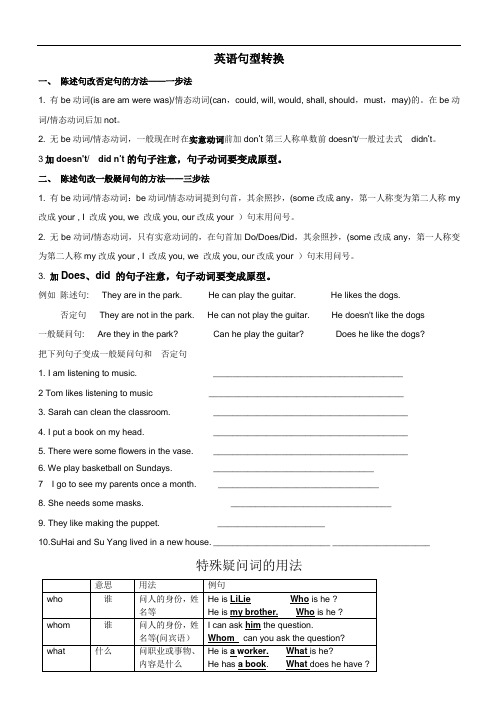
英语句型转换一、 陈述句改否定句的方法——一步法 1. 有 be 动词(is are am were was)/情态动词(can,could, will, would, shall, should,must,may)的。
在 be 动 词/情态动词后加 not。
2. 无 be 动词/情态动词,一般现在时在实意动词前加 don’t 第三人称单数前 doesn't/一般过去式 didn’t。
3 加 doesn't/ did n’t 的句子注意,句子动词要变成原型。
二、 陈述句改一般疑问句的方法——三步法 1. 有 be 动词/情态动词:be 动词/情态动词提到句首,其余照抄,(some 改成 any,第一人称变为第二人称 my 改成 your , I 改成 you, we 改成 you, our 改成 your )句末用问号。
2. 无 be 动词/情态动词,只有实意动词的,在句首加 Do/Does/Did,其余照抄,(some 改成 any,第一人称变 为第二人称 my 改成 your , I 改成 you, we 改成 you, our 改成 your )句末用问号。
3. 加 Does、did 的句子注意,句子动词要变成原型。
例如 陈述句: 否定句 一般疑问句: They are in the park. They are not in the park. Are they in the park? He can play the guitar. He can not play the guitar. Can he play the guitar? He likes the dogs. He doesn't like the dogs Does he like the dogs?把下列句子变成一般疑问句和 否定句 1. I am listening to music. 2 Tom likes listening to music 3. Sarah can clean the classroom. 4. I put a book on my head. 5. There were some flowers in the vase. 6. We play basketball on Sundays. 7 I go to see my parents once a month. 8. She needs some masks. 9. They like making the puppet. _______________________________________ ________________________________________ ________________________________________ ________________________________________ ________________________________________ _________________________________ _________________________________ _________________________________ ______________________10.SuHai and Su Yang lived in a new house. ________________________ ____________________特殊疑问词的用法意思 who whom what 谁 谁 什么 用法 问人的身份,姓 名等 问人的身份,姓 名等(问宾语) 例句 He is LiLie He is my brother. Who is he ? Who is he ?I can ask him the question. Whom can you ask the question? What is he? What does he have ?问职业或事物、 He is a worker. 内容是什么 He has a book.which哪一个问一定范围内 特指的人或物 问所属关系The big box is mine. Which box is yours? The girl at the door is Ann. Which girl is Ann? This is her book. Whose book is this ? This book is hers. Whose is this book?whose what color What time when where why how谁的 什么颜色 几点 什么时候 什么地方 为什么 怎样问颜色(表语) My skirt is red. What color is your skirt? 问具体时间 问大致时间 We play games at five in the afternoon ? What time do you play games? We play games in the afternoon ? When do you play games?问地点(状语) We play games at home on Sunday ? Where do you play games on Sunday? 问原因 问健康状况、 做事的方式等 问年龄 跟复数名词, 问数量 跟不可数名词 问数量或价钱 问路程 问 in+一段时间 问一段时间, 问物体的长短 He isn't at school today because he is ill. Why isn't he at school today ? He is fine/strong. How is he ? I go home by bike. How do you go home? He is ten. How old is he ? There are thirty boys in my class. How many boys are there in your class? There is some milk in the bottle. How much milk is there in the bottle? It's five kilometers away from here? How far is it from here? He can finish it in half an hour. How soon can he finish it ? He has lived here for a year. How long has he lived here? The desk is one meters long. How long is the desk ? I go to see my parents once a month. How often do you go to see your parents?how old how many how much how far how soon how long多大几岁 多少 多少 多远 多快,多 久 多久how often多久 (一次)问频率How 的疑问句辨析 一、how many 和 how much 的区别 how many 用来询问可数名词的数量,它的句式是:How many+复数名词+一般疑问句+? how much 用来询问不可数名词的数量,也可询问价格。
句型转换方法
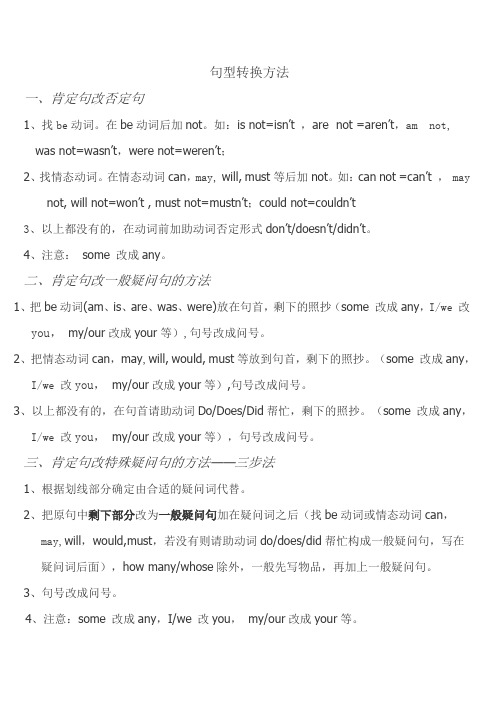
句型转换方法一、肯定句改否定句1、找be动词。
在be动词后加not。
如:is not=isn’t ,are not =aren’t,am not,was not=wasn’t,were not=weren’t;2、找情态动词。
在情态动词can,may, will, must等后加not。
如:can not =can’t ,maynot, will not=won’t , must not=mustn’t;could not=couldn’t3、以上都没有的,在动词前加助动词否定形式don’t/doesn’t/didn’t。
4、注意:some 改成any。
二、肯定句改一般疑问句的方法1、把be动词(am、is、are、was、were)放在句首,剩下的照抄(some 改成any,I/we 改you,my/our改成your等),句号改成问号。
2、把情态动词can,may,will, would, must等放到句首,剩下的照抄。
(some 改成any,I/we 改you,my/our改成your等),句号改成问号。
3、以上都没有的,在句首请助动词Do/Does/Did帮忙,剩下的照抄。
(some 改成any,I/we 改you,my/our改成your等),句号改成问号。
三、肯定句改特殊疑问句的方法——三步法1、根据划线部分确定由合适的疑问词代替。
2、把原句中剩下部分改为一般疑问句加在疑问词之后(找be动词或情态动词can,may,will,would,must,若没有则请助动词do/does/did帮忙构成一般疑问句,写在疑问词后面),how many/whose除外,一般先写物品,再加上一般疑问句。
3、句号改成问号。
4、注意:some 改成any,I/we 改you,my/our改成your等。
句型转换题的常见考点
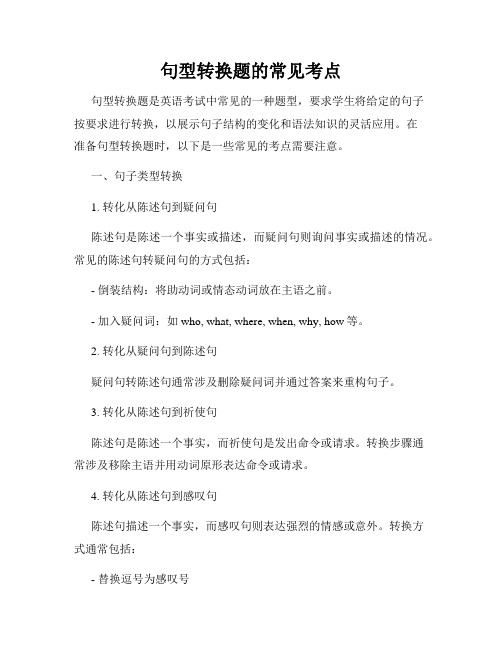
句型转换题的常见考点句型转换题是英语考试中常见的一种题型,要求学生将给定的句子按要求进行转换,以展示句子结构的变化和语法知识的灵活应用。
在准备句型转换题时,以下是一些常见的考点需要注意。
一、句子类型转换1. 转化从陈述句到疑问句陈述句是陈述一个事实或描述,而疑问句则询问事实或描述的情况。
常见的陈述句转疑问句的方式包括:- 倒装结构:将助动词或情态动词放在主语之前。
- 加入疑问词:如who, what, where, when, why, how等。
2. 转化从疑问句到陈述句疑问句转陈述句通常涉及删除疑问词并通过答案来重构句子。
3. 转化从陈述句到祈使句陈述句是陈述一个事实,而祈使句是发出命令或请求。
转换步骤通常涉及移除主语并用动词原形表达命令或请求。
4. 转化从陈述句到感叹句陈述句描述一个事实,而感叹句则表达强烈的情感或意外。
转换方式通常包括:- 替换逗号为感叹号- 添加感叹词如"How"、"What"等二、时态的转换时态转换是句型转换题的另一个常见考点。
学生需要根据句子的时间和时态要求进行相应的变化。
1. 一般现在时转换一般现在时可以转换为以下几种时态:- 一般过去时:改变动词的时态,通常是在动词后面加上-ed或改变词形。
- 现在进行时:动词变为现在分词的形式(-ing)并加上be动词。
- 现在完成时:动词变为过去分词的形式(-ed)并加上have/has。
2. 一般过去时转换一般过去时可以转换为以下几种时态:- 一般现在时:改变动词的时态,通常是在动词后面去掉-ed或改变词形。
- 过去进行时:动词变为过去分词进行形式(-ing)并加上be动词。
- 过去完成时:动词变为过去分词的形式(-ed)并加上had。
3. 一般将来时转换一般将来时可以转换为以下几种时态:- 一般现在时:使用正确形式的助动词(will,shall)或表示将来的词汇(tomorrow, next week)。
句子的句型转换

句子的句型转换句子的句型转换是英语语法中非常重要的一部分,通过改变句子的结构和句型,可以使句子更加丰富多样,增加表达的灵活性。
本文将从基本句型转换、主动语态和被动语态转换、定语从句转换以及条件句转换等几个方面来探讨句子句型的转换方法。
一、基本句型转换1. 肯定句转否定句肯定句结构为主语+谓语,将其转换为否定句,可以在谓语前加上否定副词或情态动词not。
例如:He is a teacher.(他是一位老师。
)He is not a teacher.(他不是一位老师。
)2. 否定句转肯定句否定句转肯定句可以将否定副词或情态动词not去掉。
例如:He is not a teacher.(他不是一位老师。
)He is a teacher.(他是一位老师。
)3. 一般疑问句转否定句一般疑问句转否定句可以将be动词和主语的位置交换,并在be动词后加上not。
例如:Is she a doctor?(她是医生吗?)She is not a doctor.(她不是医生。
)4. 陈述句转一般疑问句陈述句转一般疑问句可以将陈述句的主语和谓语的位置交换。
例如:You are a student.(你是学生。
)Are you a student?(你是学生吗?)5. 特殊疑问句转陈述句特殊疑问句转陈述句可以将特殊疑问词替换为对应的陈述词。
例如:Where is the library?(图书馆在哪里?)The library is over there.(图书馆在那边。
)二、主动语态和被动语态转换1. 主动语态转被动语态主动语态转被动语态的一般形式为:主语+谓语+宾语→ 宾语+be动词+过去分词+by+主语。
例如:They built a new bridge.(他们修建了一座新桥。
)A new bridge was built by them.(一座新桥被他们修建了。
)2. 被动语态转主动语态被动语态转主动语态的一般形式为:宾语+be动词+过去分词+by+主语→ 主语+谓语+宾语。
句型转换ppt课件

在句型转换时,应根据语境和表达需求选择适当的转换方式,如主动句变被动句、肯定句变否定句等 。通过灵活运用不同的转换方式,可以使句子更加丰富多样,增强语言的表现力。
注意句子语序的调整
总结词
在句型转换过程中,语序的调整是一个重要 的技巧。
详细描述
由于中文的语法结构与英语不同,在进行句 型转换时,需要注意语序的调整。通过合理 安排词语的顺序,可以更好地表达句子的意 思,并使句子更加符合中文的表达习惯。在 进行语序调整时,可以参考中文的语法规则 和习惯用法,以确保转换后的句子语序正确 、流畅自然。
示例
将“The cat sat on the mat.” 的主语转换为“A cat sat on a mat.”
谓语转换
谓语转换
改变原句的谓语动词,以表达不同的 语气或强调不同的重点。
示例
将“The dog chased the ball.”的谓 语转换为“The ball was chased by the dog.”
主语错误
主语缺失
主语与谓语搭配不当
在句子中没有明确的主语,导致句子 结构不完整。
主语和谓语之间缺乏逻辑关系或语义 联系。
主语错位
主语的位置不正确,导致句子意思表 达不清。
谓语错误
谓语缺失
句子中缺少谓语,导致句子结构不完整。
谓语错位
谓语的位置不正确,导致句子意思表达不清。
谓语与宾语搭配不当
谓语和宾语之间缺乏逻辑关系或语义联系。
句型转换ppt课件
目 录
• 句型转换简介 • 简单句型转换 • 复合句型转换 • 句型转换技巧 • 句型转换练习 • 句型转换常见错误与纠正
01
句型转换简介
英语句型转换的方法与例子

英语句型转换的方法与例子摘要英语句型转换是指按照一定的要求,把一个句子改写成另一个意思相同或相近的句子,不改变原句的主要意思。
英语句型转换的目的是为了使句子更加简洁、准确、自然和地道,也可以增加句子的变化和丰富性,避免重复和单调。
英语句型转换的方法有很多,本文将介绍以下几种常见的方法:同义词或近义词替换主动语态和被动语态互换陈述句和疑问句互换直接引语和间接引语互换并列句和复合句互换定语从句和非限制性定语从句互换分词短语和独立主格结构互换一、同义词或近义词替换定义同义词或近义词替换是指用意思相同或相近的词或短语来替换原句中的某些词或短语,使句子更加简洁、准确或地道。
规则替换的词或短语必须在意思、用法、搭配和语气上与原词或短语相符。
替换后的句子不能改变原句的主要意思。
替换后的句子不能造成歧义或误解。
例子原句替换后的句子He is very angry with me.He is very mad at me.She passed away last night.She died last night.He made a mistake in the test.He went wrong in the test.I can't stand him.I hate him.He gave me a hand with my homework.He helped me with my homework.二、主动语态和被动语态互换定义主动语态和被动语态互换是指把一个主动语态的句子改写成一个被动语态的句子,或者把一个被动语态的句子改写成一个主动语态的句子,使句子更加客观、强调或适应上下文。
规则主动语态变被动语态时,要把原主语变成by短语放在被动语态谓语之后,把原宾语变成新主语放在被动语态谓语之前,把原谓语动词变成被动形式(即be+过去分词),并保持时态、人称和数一致。
被动语态变主动语态时,要把原by短语去掉,把原主语变成新宾语放在主动谓语之后,把原谓语动词变成主动形式,并保持时态、人称和数一致。
句型转换的句子有哪些类型
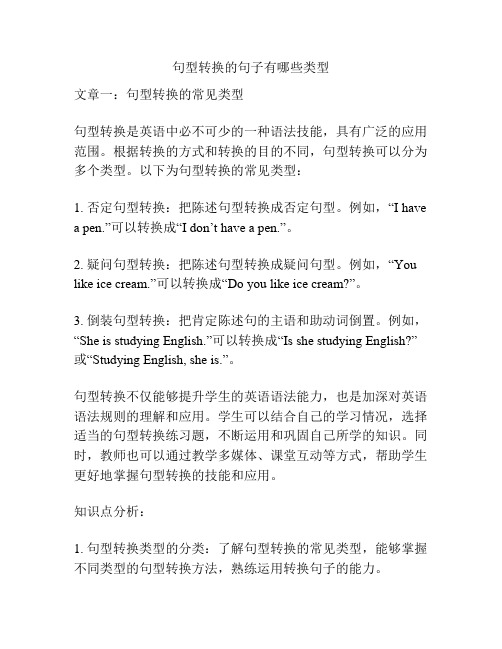
句型转换的句子有哪些类型文章一:句型转换的常见类型句型转换是英语中必不可少的一种语法技能,具有广泛的应用范围。
根据转换的方式和转换的目的不同,句型转换可以分为多个类型。
以下为句型转换的常见类型:1. 否定句型转换:把陈述句型转换成否定句型。
例如,“I havea pen.”可以转换成“I don’t have a pen.”。
2. 疑问句型转换:把陈述句型转换成疑问句型。
例如,“You like ice cream.”可以转换成“Do you like ice cream?”。
3. 倒装句型转换:把肯定陈述句的主语和助动词倒置。
例如,“She is studying English.”可以转换成“Is she studying English?”或“Studying English, she is.”。
句型转换不仅能够提升学生的英语语法能力,也是加深对英语语法规则的理解和应用。
学生可以结合自己的学习情况,选择适当的句型转换练习题,不断运用和巩固自己所学的知识。
同时,教师也可以通过教学多媒体、课堂互动等方式,帮助学生更好地掌握句型转换的技能和应用。
知识点分析:1. 句型转换类型的分类:了解句型转换的常见类型,能够掌握不同类型的句型转换方法,熟练运用转换句子的能力。
2. 句子成分的转换:句型转换时需要对句子中的不同成分进行变换。
了解句子中包括的成分及其在不同种类句子中的作用,能够更好地进行句型转换。
3. 英语语法规则:句型转换是基于英语语法规则的。
掌握英语语法规则能够帮助学生更深入地理解句型转换的本质和原则,提高句型转换的准确性和效率。
文章二:如何提高句型转换的能力句型转换是英语语法中的重要部分,也是英语学习中的难点之一。
如何提高句型转换的能力,让自己的英语水平更上一层楼呢?以下为几点建议:1. 提高英语词汇量:句型转换涉及到不同的英语语法成分,但其也与英语单词的词性、释义等相关。
提高英语词汇量可以更好地理解英语句子的含义和结构,从而更准确地转化句子。
六年级英语句型转换及答案

六年级英语句型转换及答案在六年级的英语学习中,学生们需要掌握并运用多种英语句型进行表达。
句型转换是提高语言运用能力的重要一环,通过对原句进行改写,学生们可以更加灵活地运用所学的语法知识来表达自己的意思。
下面将详细介绍一些常见的六年级英语句型转换,并给出相应的答案。
1. 肯定句转否定句:将肯定句改为否定句时,通常需要在动词前加上否定词not。
例如:She is my friend. → She is not my friend.2. 否定句转肯定句:将否定句改为肯定句时,通常需要去掉否定词not。
例如:He doesn't like soccer. → He likes soccer.3. 一般疑问句转陈述句:将一般疑问句改为陈述句时,通常需要用肯定或否定回答中的一个来作为答句。
例如:Do you like ice cream? → Yes, I do. / No, I don't.4. 陈述句转特殊疑问句:将陈述句改为特殊疑问句时,通常需要将疑问词放在句首。
例如:You are from China. → Where are you from?5. 一般现在时转一般过去时:将一般现在时改为一般过去时时,通常需要将动词的过去式形式。
例如:She sings well. → She sang well.6. 一般过去时转一般将来时:将一般过去时改为一般将来时时,通常需要在动词前加助动词will。
例如:They visited the museum last week. → They will visit the museum next week.7. 现在进行时转一般现在时:将现在进行时改为一般现在时时,通常需要去掉be动词,并根据主语的单复数形式来决定动词的形式。
例如:I am reading a book. → I read a book.8. 一般现在时转现在进行时:将一般现在时改为现在进行时时,通常需要在动词前加上be动词,并将动词的原形变为-ing形式。
语文句型转换100题
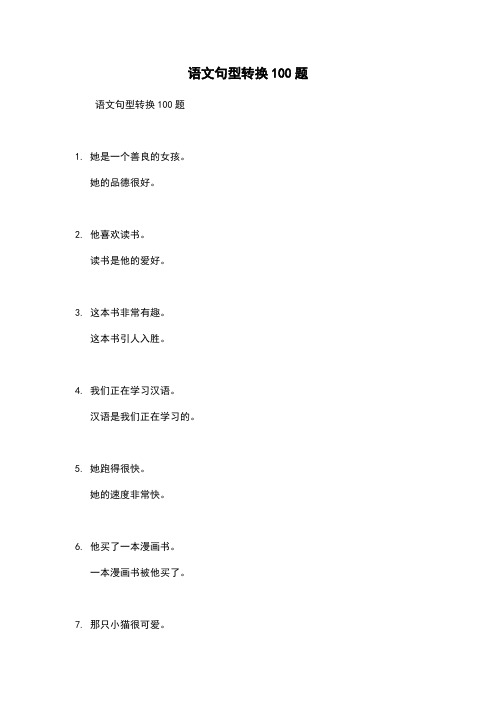
语文句型转换100题语文句型转换100题1. 她是一个善良的女孩。
她的品德很好。
2. 他喜欢读书。
读书是他的爱好。
3. 这本书非常有趣。
这本书引人入胜。
4. 我们正在学习汉语。
汉语是我们正在学习的。
5. 她跑得很快。
她的速度非常快。
6. 他买了一本漫画书。
一本漫画书被他买了。
7. 那只小猫很可爱。
小猫非常可爱。
8. 他们一起去了电影院。
他们共同去了电影院。
9. 我们在公园里玩得很开心。
在公园里玩是我们快乐的。
10. 她唱歌唱得很动听。
她的歌声非常动听。
11. 昨天我去了图书馆。
我昨天去了图书馆。
12. 我的妈妈正在做晚饭。
晚饭是我妈妈正在做的。
13. 我喜欢吃水果。
吃水果是我喜欢的。
14. 他喜欢打篮球。
打篮球是他的爱好。
15. 他们去了动物园。
去动物园是他们的行动。
16. 我们正在学习数学。
数学是我们正在学习的。
17. 这个问题很难。
这个问题很具挑战性。
18. 她写字写得非常漂亮。
她的字迹很漂亮。
19. 我昨天做了一本书的读后感。
一本书的读后感是我昨天做的。
20. 我们一起去了公园。
共同去公园是我们的行动。
21. 她唱歌唱得很好听。
她的歌声非常动听。
22. 他昨天去了超市。
昨天他去了超市。
23. 我正在写一篇作文。
写作文是我正在做的。
24. 我们喜欢看电影。
看电影是我们喜欢的。
25. 她喜欢画画。
画画是她的爱好。
26. 他们去了海滩。
去海滩是他们的行动。
27. 我们正在学习英语。
英语是我们正在学习的。
28. 这个问题很复杂。
这个问题很具挑战性。
29. 她跳舞跳得很优美。
她的舞姿非常优美。
30. 我昨天读了一本有趣的小说。
一本有趣的小说是我昨天读的。
31. 我们一起去了游乐场。
共同去游乐场是我们的行动。
32. 他唱歌唱得很动听。
他的歌声非常动听。
33. 她昨天去了图书馆。
昨天她去了图书馆。
34. 我的爸爸正在看电视。
看电视是我爸爸正在做的。
35. 我喜欢吃巧克力。
吃巧克力是我喜欢的。
36. 他喜欢踢足球。
语文句型转换方法

语文句型转换方法
语文句型转换,指的是将语文中的句子从一种形式转换为另一种形式,使其表达方式更加多样化和灵活。
以下是一些常见的语文句型转换方法:
1. 主谓结构转换为倒装结构:
原句:他在操场上跑步。
倒装结构:在操场上跑步的是他。
2. 主谓结构转换为被动语态:
原句:杰克吃了苹果。
被动语态:苹果被杰克吃了。
3. 肯定句转换为否定句:
原句:他每天都看书。
否定句:他每天都不看书。
4. 陈述句转换为疑问句:
原句:他是一位医生。
疑问句:他是一位医生吗?
5. 肯定句转换为感叹句:
原句:今天天气真好!
感叹句:今天的天气真好啊!
6. 直接引语转换为间接引语:
原句:小明说:“我喜欢吃巧克力。
”
间接引语:小明说他喜欢吃巧克力。
7. 使用虚拟语气:
原句:要是我有时间,我就去看电影。
虚拟语气:要是我有时间,我就去看电影了。
8. 简单句转换为复合句:
原句:我今天去了图书馆。
复合句:我今天去了图书馆,想借几本书回来看。
9. 使用比较级和最高级:
原句:这本书很好看。
比较级:这本书比那本更好看。
最高级:这本书是我看过的最好看的。
10. 使用省略句:
原句:我喜欢吃冰激凌,(而)且我喜欢巧克力口味的。
省略句:我喜欢吃冰激凌,且喜欢巧克力口味的。
以上是关于语文句型转换的一些常见方法,通过句型转换,可以让语文表达更加灵活多样,增强语言的表达能力。
句型转换

句型转换动词第三人称单数--三单变化和名词复数变化1.直接加 s 。
2.以 o,h 结尾的加 es 。
3.以 y 结尾的去y 加 ies 。
动词的ing形式变化1.直接加 ing 。
2.以e 结尾的去e 加ing 。
3.双写结尾字母加 ing 。
一、肯定句变否定句。
1.直接在原来句子中的be动词(am,is,are )和情态动词can/should/will/must的后面加 not 。
2.无be 无can/should/will/must ,在动词前添加 don’t 或doesn’t .I going to the bookstore.2.He is going to buy some word books.He going to buy some word books.3.She is watching TV now.She watching TV now.4.They are going to drow some picpures.They going to drow some picpures.5.I can run.I run.6. I like dancing.I dancing.7. He reads books.He books.8.We go to school on Sunday . We to school on Sunday.9.Tom often walks to school.Tom often to school.二、肯定句变一般疑问句。
1.把原来句子中的be动词( is,are )和情态动词can移到第一个位子,其它照抄。
注意每个句子的首字母要大写。
2.有be/can 的把be/can提前到第一个单词,无can无be 时第一个单词填Do/Does 。
不能有WH特殊疑问词。
注意:肯定句里的I/my变成疑问句时是 you/your ,肯定句的am 变成疑问句是 are 。
句型转换是什么句子类型的词语

句型转换是什么句子类型的词语文章一:句型转换是什么句子类型的词语一、什么是句型转换?句型转换指在不改变句子意思的情况下,将一种句型转换成另一种句型。
常见的句型转换包括:陈述句转换成疑问句、否定句、条件句等,疑问句转换成陈述句、祈使句等。
句型转换是语法知识的重要内容之一,也是英语学习中难度较大的部分之一。
二、句型转换属于哪种类型的句子?句型转换不属于某种具体的句子类型,而是一种语法操作。
在英语中,根据句子的结构和目的,可分为七种基本句型,分别是:S+V、S+V+O、S+V+C、S+V+IO+DO、S+V+DO、S+V+O+O和S+V+O+OC。
通过句型转换,同一个句子可以变成这七种不同的句型之一。
三、句型转换的技巧与注意事项1. 在转换句子时要保证句意不变,例如:He plays basketball every day. (陈述句) → Does he play basketball every day? (疑问句)。
在转换过程中,要注意动词时态、人称等的变化。
2. 句型转换需要根据不同的情形选择合适的变化方式。
例如,将"If it rains tomorrow, I will stay at home."转换为祈使句:"Stay at home if it rains tomorrow."。
3. 句型转换需要熟练掌握各种语法结构和变化规律。
例如,将"He is a student who studies hard."转换为倒装句:"Hard as he studies, he is a student."。
在英语学习中,句型转换是提高语言能力的重要一环,可以帮助学生建立稳固的语法基础,提升语言综合运用能力。
文章二:句型转换中常用的短语和词语一、常用的短语和词语句型转换中常用的短语和词语有很多,下面列出一些常见的:1. 对照句型:通过对比两个不同语言形式的句子,帮助学生快速记忆句型的变化规律。
句型转换
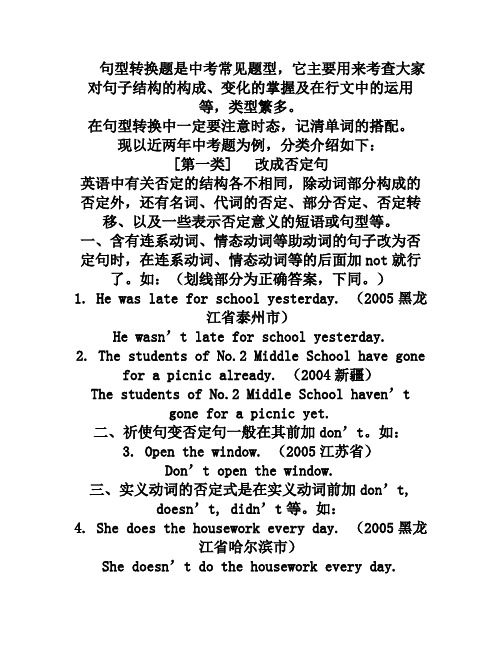
句型转换题是中考常见题型,它主要用来考查大家对句子结构的构成、变化的掌握及在行文中的运用等,类型繁多。
在句型转换中一定要注意时态,记清单词的搭配。
现以近两年中考题为例,分类介绍如下:[第一类] 改成否定句英语中有关否定的结构各不相同,除动词部分构成的否定外,还有名词、代词的否定、部分否定、否定转移、以及一些表示否定意义的短语或句型等。
一、含有连系动词、情态动词等助动词的句子改为否定句时,在连系动词、情态动词等的后面加not就行了。
如:(划线部分为正确答案,下同。
)1. He was late for school yesterday. (2005黑龙江省泰州市)He wasn’t late for school yesterday.2. The students of No.2 Middle School have gonefor a picnic already. (2004新疆)The students of No.2 Middle School haven’tgone for a picnic yet.二、祈使句变否定句一般在其前加don’t。
如:3. Open the window. (2005江苏省)Don’t open the window.三、实义动词的否定式是在实义动词前加don’t,doesn’t, didn’t等。
如:4. She does the housework every day. (2005黑龙江省哈尔滨市)She doesn’t do the housework every day.5. He returned the book to the library thismorning. (2004重庆市)He didn’t return the book to the library thismorning.注意:变否定句时须注意某些词语的变化,如some改为any, something改为anything, already改为yet, both改为neither, all改为none等。
句型转换

每年的中考试卷中,“句型转换”题所占分值较大,是为了全面考查学生在初中阶段所学的词汇(同义或反义)、短语、句型和语法等方面的知识及其它的之间的灵活运用能力。
Ⅰ.题型介绍所谓“句型转换”就是先给一个完整的句子A,再根据括号内的要求(有时没有明确,须自己观察),在第二个句子B的空白处填上适当的词来完成的句型转换。
Ⅱ.题型分类从形式上看,有如下几种形式:①某一词或词组的转换;②词组与句子的转换;③同义句型的转换;④为纠正常犯语言错误而设计的题目。
从内容上看,此题型涉及的面较广,主要有:①句子功能方面的转换。
包括陈述句(肯定与否定)、四种题疑问句、祈使句、感叹句的转换;②句子结构方面的转换。
即简单句、复合句、并列句之间的转换;③语态的转换。
即主动语态与被动语态之间的转换;④常用句型与词汇手段的转换。
Ⅲ.具体分类如下一、陈述句与疑问句、祈使句、感叹句间的转换1、陈述句中肯定句变为否定句,大部分是用not来改变谓语结构,但也有借用否定意义的词,如nothing, nobody, none, neither, little, few, never, hardly等,例如::A:Tom does well in maths.B:Tom doesn't do in maths.A:He has much to do.B:He has nothing to do.A:All of my classmates like art.B:None of my classmates likes art.2、改为疑问句。
根据上下句的结构和词的减少,来判断变为哪一种形式的疑问句。
例如:A:My brother often has breakfast at school.B: Does your brother often have breakfast at school?A:Tom's already weak in English.B:Tom's already weak in English, isn't he ?A:The red light changes every two minutes.B:How often does the red light change?3、改为感叹句。
句型转换大全及答案语文

句型转换大全及答案语文一、句型转换介绍句型转换是语文学习中一个重要的知识点,通过改变句子的结构和方式,达到表达意思的不同目的。
掌握句型转换可以丰富语言表达,提升写作能力。
在语文学习中,常见的句型转换包括主谓互换、改变句子成分、改变句子的语态、改变句子的时态等。
二、句型转换示例下面是一些常见的句型转换示例及其答案:1. 主谓互换示例一:原句:小明正在做作业。
转换句:作业正在被小明做。
示例二:原句:他喜欢音乐。
转换句:音乐是他喜欢的。
2. 改变句子成分示例一:原句:这本书是我妈妈买的。
转换句:我妈妈买了这本书。
示例二:原句:他是一个好学生。
转换句:一个好学生就是他。
3. 改变句子的语态示例一:原句:他们正在讨论这个问题。
转换句:这个问题正在被他们讨论。
示例二:原句:我们将组织一次演讲比赛。
转换句:一次演讲比赛将被我们组织。
4. 改变句子的时态示例一:原句:他明天要去上海。
转换句:他后天将去上海。
示例二:原句:昨天我买了一条裙子。
转换句:明天我将去买一条裙子。
三、句型转换答案解析1. 主谓互换主谓互换是将原句中的主语和谓语进行位置调换。
例如,原句“小明正在做作业”,转换句“作业正在被小明做”。
这样的转换可以突出行为或事物,丰富句子表达。
2. 改变句子成分改变句子成分是通过改变句子中的词语位置或者将其中的部分词语进行省略、替换等方式进行转换。
例如,原句“这本书是我妈妈买的”,转换句“我妈妈买了这本书”。
这样的转换可以使句子更加简洁明了。
3. 改变句子的语态改变句子的语态是通过改变句子中的谓语动词形式,将主动语态转换为被动语态,或者将被动语态转换为主动语态。
例如,原句“他们正在讨论这个问题”,转换句“这个问题正在被他们讨论”。
这样的转换可以使句子的焦点发生变化,突出动作的承受者。
4. 改变句子的时态改变句子的时态是通过改变句子中动词的时态形式,转换句子的时间概念。
例如,原句“他明天要去上海”,转换句“他后天将去上海”。
句型转换练习题及答案

句型转换练习题及答案句型转换练习题及答案语言是人类交流的基本工具,而句型则是构建语言的基本单位。
在学习语言的过程中,掌握句型转换是非常重要的一部分。
通过句型转换,我们可以更灵活地运用语言,表达自己的思想和观点。
下面是一些句型转换的练习题及答案,希望能够帮助大家提高语言表达能力。
练习题一:改写句子的时态1. He will go to the park tomorrow.改为一般现在时:He goes to the park tomorrow.改为过去时:He went to the park tomorrow.2. They have been studying English for two years.改为一般将来时:They will have been studying English for two years.改为过去完成时:They had studied English for two years.3. She is going to visit her grandparents next week.改为一般过去时:She visited her grandparents next week.改为现在进行时:She is visiting her grandparents next week.练习题二:改写句子的语态1. They built a new bridge last year.改为被动语态:A new bridge was built by them last year.2. We are cleaning the house now.改为被动语态:The house is being cleaned by us now.3. Someone has stolen my wallet.改为被动语态:My wallet has been stolen by someone. 练习题三:改写句子的句式1. I like playing football.改为否定句:I don't like playing football.改为一般疑问句:Do you like playing football?2. She can speak three languages.改为否定句:She can't speak three languages.改为特殊疑问句:What languages can she speak?3. He is a doctor.改为感叹句:What a doctor he is!练习题四:改写句子的形式1. He said, "I am busy now."改为间接引语:He said that he was busy then.2. "Please close the door," she said.改为间接引语:She asked me to close the door.3. "Don't eat too much," my mother said to me.改为间接引语:My mother told me not to eat too much. 答案:练习题一:1. He goes to the park tomorrow.2. He went to the park tomorrow.3. She visited her grandparents next week.4. She is visiting her grandparents next week.练习题二:1. A new bridge was built by them last year.2. The house is being cleaned by us now.3. My wallet has been stolen by someone.练习题三:1. I don't like playing football.2. Do you like playing football?3. She can't speak three languages.4. What languages can she speak?5. What a doctor he is!练习题四:1. He said that he was busy then.2. She asked me to close the door.3. My mother told me not to eat too much.通过这些句型转换的练习题,我们可以更好地理解和运用不同的句型,提高语言表达的能力。
句型转换知识点总结

句型转换知识点总结句型转换是英语学习中的一个重要部分,它可以帮助我们扩展句子结构,丰富表达方式,提高语言表达的准确性和流畅度。
在本文中,我们将总结一些常见的句型转换知识点,并提供相应的例子。
1. 主动语态与被动语态的转换主动语态句子的主语是动作的执行者,而被动语态句子的主语是动作的承受者。
转换时需要注意句子结构和动词形式的变化。
例子:主动语态:The teacher praised the student.被动语态:The student was praised by the teacher.2. 直接引语与间接引语的转换直接引语是通过引号将他人的原话直接呈现出来,而间接引语是将他人的原话进行转述并改变时态和人称。
例子:直接引语:He said, "I am going to the party."间接引语:He said that he was going to the party.3. 否定句转换否定句的转换可以通过加入否定副词或使用相应的否定结构来完成。
例子:肯定句:She is studying English.否定句:She is not studying English.否定句转换:I wish she were studying English.4. 疑问句与陈述句的转换疑问句转换为陈述句时,除了要改变词序外,还需要注意动词的形式。
例子:疑问句:Do you like movies?陈述句:You like movies.5. 句子类型转换宣句转换为感叹句或疑问句时,语序和词语会有一定的变化。
例子:宣句:He is a great musician.感叹句:What a great musician he is!疑问句:Is he a great musician?通过以上几个知识点的总结,我们可以更好地理解和应用句型转换,从而提升我们的语言表达能力。
在实际的学习过程中,我们应该多加练习和应用,以提高我们对句型转换的熟练度和灵活运用能力。
句型转换是什么句子

句型转换是什么句子文章1:句型转换是什么句子?句型转换是英语学习中常见的一种练习形式,它指的是将一句话用不同的句式、语态、时间等进行转换,从而加深对英语句子结构的理解。
句型转换练习可以帮助学生扩展词汇、提高语法水平并培养口语表达能力。
本文将分析句型转换练习的三个知识点。
1.语法知识句型转换练习是对语法知识的深入掌握和灵活运用。
在练习过程中,我们需要了解英语中不同类型的句子结构,如简单句、复合句和复合复句等,以及它们的基本要素,如主语、谓语、宾语、定语和状语等。
只有掌握好这些基本的语法知识,才能够灵活地进行句式转换,并且运用到我们的写作和口语表达中。
2.语音知识句型转换练习也常常涉及到英语的语音知识,比如疑问句和陈述句的语气不同,所以它们语音上的重音位置也不同。
在进行句型转换的时候,我们不仅需要注意语法结构,还需要注意句子的语音和语调等声音方面的变化。
同时,在进行英语口语训练的过程中,语音和语调也是需要注意的重要的内容,只有掌握好了这些,才能够更加自然地流利交流。
3.语境知识句型转换也需要结合语境来进行。
有时候,同样的句子结构在不同的情境下需要不同的解释和翻译。
在进行句型转换的时候,我们需要考虑上下文,理解所表达的含义和相关背景,然后再根据需要进行相应地转换。
语境知识对于英语学习非常重要,而句型转换练习则可以帮助我们更好地理解语境,提高我们的英语水平。
总之,句型转换是一个非常实用的英语学习练习方式。
只有通过深入的学习和掌握语法、语音和语境相关的知识,才能够更好地进行句型转换和提高英语水平,才能够在写作和口语表达中更加自如和自信。
文章2:句型转换是什么?句型转换是英语学习中的一种非常实用的练习方式,它可以通过将一句话转换为另一种结构、句式、时态等来考察学生对英语语法和句子结构的理解。
句型转换练习可以帮助学生扩展词汇、加深语法知识的掌握并提高口语表达能力。
在本文中,我们将分析句型转换的三个知识点。
1.语法知识句型转换练习首先需要学生具备扎实的语法知识,尤其是英语句子结构的不同类型,如简单句、复合句和复合复句等,以及它们的基本要素,如主语、谓语、宾语、定语和状语等。
- 1、下载文档前请自行甄别文档内容的完整性,平台不提供额外的编辑、内容补充、找答案等附加服务。
- 2、"仅部分预览"的文档,不可在线预览部分如存在完整性等问题,可反馈申请退款(可完整预览的文档不适用该条件!)。
- 3、如文档侵犯您的权益,请联系客服反馈,我们会尽快为您处理(人工客服工作时间:9:00-18:30)。
Ⅳ、句型转换。
根据要求转换下面句型,每空一词。
缩写词算一个词。
(10分)A篇1.Tom often goes to the cinema on Sunday.(变为否定句)Tom ______________ often _____________ to the cinema on Sunday.2.He does his homework in the evening.(改为否定句)He _________ _________ his homework in the evening.3.Her daughter can dance.(改为疑问句)________ Her daughter _________?B篇1.My sister has eggs in the morning.(变一般疑问句)___________ your sister ____________ eggs in the morning?2.We have got some carrots.(改为否定句)We _____ got _______ carrots.3.Helen can swim.(改为一般疑问句)________ Helen _______?4.I'd like a glass of milk.(改为一般疑问句)_________ you _________ a glass of milk?C篇1.There are five people in his family.(对划线部分提问)____________ ___________ people are there in his family?2.My mother works in a hospital(对划线部分提问)________ _________ your mother work?3.She always has breakfast at home.(对划线部分提问)_________ does she always _________ breakfast?4.School starts at 8:00(对划线部分提问)_____ ________ school start?_______ _______ ________ school start?5.There are some books on the desk.(对划线部分提问)________ ________ books _______ there on the desk.6.My favorite drink is orange.(对画线部分提问)_______ ______ favorite drink?7.She is an actor.(对划线部分提问)_________ __________ ___________ _________?__________ ___________ __________ ____________?D篇1.Marry is an American girl.(改为同义句)Marry ______ ________ America.2.They haven't got any brothers and they haven't got any sisters.(改为同义句)They haven't got any brothers _________ _________.3.I like action movies best.(改为同义句)My __________ _______ are action movies.Action movies are _______ __________ ________.4.She always go on the Internet at home.(用now 来改写句子)She ______ ________ on the Internet at home now.5.Let’s go swimming.( 改为同义句)_______ ________ going swimming.6.He is still working. (改为同义句)He is still ____ ______.7.He is searching for the information now.(改为同义句)He is searching for the information ______ _____ ________.1.Is it your piano?(改为复数句)________ ________ your pianos?2.This is my scarf(改为疑问句)________ ______ your ________?3.This is an egg.(改为复数形式)These ______ eggs.D篇1.What’s the weather like in London in summer?(改为同义句)_______ _________ ________ in London in summer?2.I am Chinese.(改为同义句)I ____ _______ .3.She is from England.(改为同义句)She ______ _______ England.4.What about going on the Internet?(改为同义句)______ _________ going on the Internet?5.The boy is behind the girl.(改为同义句)The girl is _______ ________ ________ the boy.6.Is this your family.(作肯定回答)Yes ,_______ ________.7.Are these your grandparents.(作否定回答)No, _____ _________.*.Is there any food on the table?(作肯定回答)Yes,_____ _________.8.Too much chocolate is bad for you.(改为同义句)Too much chocolate ____ _______ ______ you.9.I like geograghy because it is interesting.(改为同义句)_________ __________ you _________ geograghy?10.We have Chinese,English and Maths every day.______ _______ _________ you have?11.The lions are different from the pandas.( 改为同义句)The lions_______ _________ __________ _________ the pandas.12.I often send emails to my friends.(改为同义句)I often _________ ________ ___________.13.She gives me a magazine.(改为同义句)She gives ________ ___________ ___________ me.14.I would like a cake for my birthday.(对划线部分提问)________ ___________ ___________ ___________ for your birthday?15.My mother buys me a magazine.(改为同义句)My mother buys _________ ____________ _______________ me.16.He spends a lot of money buying books.He spends a lot of money_______ books.17.we have a good time.(改为同义句)we __________ _____________ .18.The children look at the cute pandas.(改为同义句)The children ________ __________ ______________ __________ the cute pandas.19.They are talking to each other.(对划线部分提问)________ __________ ____________ doing?20.She is listening to the music.(改为疑问句)_______ ___________ __________ to the music?21.I do exercise once a day(对划线部分提问)_______ _________ __________ you do exercise? 22.What a big classroom it is.(改为同义句)_______ ___________ the classroom is.23.My name is Bill Gates.(对划线部分提问)_______ _____________ ___________ _____________?24.Can you help me ,please?Yes,sure.(改为同义句)Yes,________ ___________.25.I get up at seven thirty.(改为同义句)I get up at ______ _______ ________.26.What time is it?(改为同义句)What ______ ______ ________.27.Our school has got two libraries.(改为同义句)______ _________ two libraries in our school.28.I am in Class 3.(对划线部分提问)____ ______ are you in?29.Thanks for your help(改为同义句)______ ______ for ________ _________ me.30.I am WangLingling.(改为同义句)____ _______ ________ WangLingling.。
